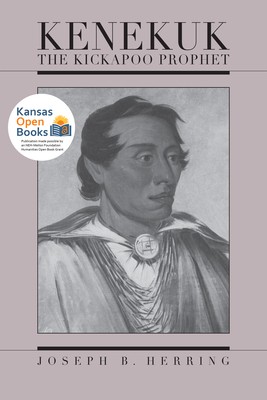
- We will send in 10–14 business days.
- Author: Joseph B Herring
- Publisher: University Press Of Kansas
- ISBN-10: 0700631542
- ISBN-13: 9780700631544
- Format: 15.2 x 22.9 x 1.1 cm, softcover
- Language: English
- SAVE -10% with code: EXTRA
Reviews
Description
Most of the Indians whose names we remember were warriors--Tecumseh, Black Hawk, Sitting Bull, Crazy Horse, Geronimo--men who led their people in a desperate defense of their lands and their way of life. But as Alvin Josephy has written, "Some of the Indians' greatest patriots died unsung by white men, and because their peoples were also obliterated, or almost so, their names are forgotten."
Kenekuk was one of those unsung patriots. Leader of the Vermillion Band Kickapoos and Potawatomis from the 1820s to 1852, Kenekuk is today little known, even in the Midwest where his people settled. His achievements as the political and religious leader of a small band of peaceful Indians have been largely overlooked. Yet his leadership, which transcended one of the most difficult periods in Native American history--that of removal--was no less astute and courageous than that of the most warlike chief, and his teachings continued to guide his people long after his death. In his policies as well as his influence he was unique among American Indians. In this sensitive and revealing biography, Joseph Herring and explores Kenekuk's rise to power and astute leadership, as well as tracing the evolution of his policy of acculturation. This strategy proved highly effective in protecting Kenekuk's people against the increasingly complex, intrusive, and hostile white world. In helping his people adjust to white society and retain their lands without resorting to warfare or losing their identity as Indians, the Kickapoo Prophet displayed exceptional leadership, both secular and religious. Unlike the Shawnee Prophet and his brother Tecumseh, whose warlike actions proved disastrous for their people, Kenekuk always stressed peace and outward cooperation with whites. Thus, by the time of his death in 1852, Kenekuk had prepared his people for the challenge of maintaining a separate and unique Indian way of life within a dominant white culture. While other bands disintegrated because they either resisted cultural innovations or assimilated under stress, the Vermillion Kickapoos and Potawatomis prospered.EXTRA 10 % discount with code: EXTRA
The promotion ends in 20d.02:53:53
The discount code is valid when purchasing from 10 €. Discounts do not stack.
- Author: Joseph B Herring
- Publisher: University Press Of Kansas
- ISBN-10: 0700631542
- ISBN-13: 9780700631544
- Format: 15.2 x 22.9 x 1.1 cm, softcover
- Language: English English
Most of the Indians whose names we remember were warriors--Tecumseh, Black Hawk, Sitting Bull, Crazy Horse, Geronimo--men who led their people in a desperate defense of their lands and their way of life. But as Alvin Josephy has written, "Some of the Indians' greatest patriots died unsung by white men, and because their peoples were also obliterated, or almost so, their names are forgotten."
Kenekuk was one of those unsung patriots. Leader of the Vermillion Band Kickapoos and Potawatomis from the 1820s to 1852, Kenekuk is today little known, even in the Midwest where his people settled. His achievements as the political and religious leader of a small band of peaceful Indians have been largely overlooked. Yet his leadership, which transcended one of the most difficult periods in Native American history--that of removal--was no less astute and courageous than that of the most warlike chief, and his teachings continued to guide his people long after his death. In his policies as well as his influence he was unique among American Indians. In this sensitive and revealing biography, Joseph Herring and explores Kenekuk's rise to power and astute leadership, as well as tracing the evolution of his policy of acculturation. This strategy proved highly effective in protecting Kenekuk's people against the increasingly complex, intrusive, and hostile white world. In helping his people adjust to white society and retain their lands without resorting to warfare or losing their identity as Indians, the Kickapoo Prophet displayed exceptional leadership, both secular and religious. Unlike the Shawnee Prophet and his brother Tecumseh, whose warlike actions proved disastrous for their people, Kenekuk always stressed peace and outward cooperation with whites. Thus, by the time of his death in 1852, Kenekuk had prepared his people for the challenge of maintaining a separate and unique Indian way of life within a dominant white culture. While other bands disintegrated because they either resisted cultural innovations or assimilated under stress, the Vermillion Kickapoos and Potawatomis prospered.

Reviews